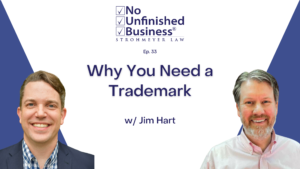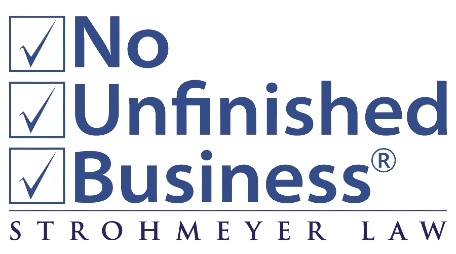How to Avoid Post-Death Family Fighting
Avoiding Family Fights
Is your family an emotional powder keg and the only thing keeping the fights from exploding is you being around to stop them? Today we’re talking about how to identify and hopefully defuse some of those potential fights that may happen once you’re gone.
VIDEO TRANSCRIPT:
Three things. First, we want to know what are these possible fights? So how can we identify what the fights are that may be brewing? Secondly, is there anything we can do that may head that fight off? And finally, if we can’t head that fight off, what can we do to minimize it?
So the first thing is we want to know: what could go wrong with our plan? People get upset when they have to share what they think maybe isn’t too fair. So it could be, they didn’t get enough, they didn’t get their own share, or they didn’t get what they wanted. So the best way to preempt this is having conversations with your family while you’re still alive. What is it that people want? And is that a reasonable goal? If they know what they’re looking for and if you know what they’re looking for, and you know what you’re looking to give them, it’s much better to just sit everybody down and say, “Here, this is my plan, this is what I’m thinking of giving people.”
I know this seems a little gauche. We’re telling people what they’re going to be getting or what we expect to get. The better part of this though, is you can suss out if anybody is going to have a fit because they’re not getting the share that they thought was appropriate.
Then it’s better to know now so that you can work to resolve that later. If you go to your grave, thinking everything was fine only to have your family explode the moment you’re gone, that doesn’t really help. So by having that hard conversation, now you’re going to help identify those issues now and identify who those people are who could cause a problem. It’s better to figure this out now so that you know, and you can work with your family to resolve it so it’s not a bigger issue later.
Second, you want to identify what they think they’re looking for. It doesn’t mean that you have to give this to them, but it does let you figure out what they’re looking for, because if you can figure out what they’re looking for, you might be able to craft something that works better for them.
In some cases, it may just be the souvenir that they want to get from a trip to Disney world. And there are three kids and only one souvenir. I had a case years ago where one family member, the mom was eventually going to die, like all of us. And there was one carved apple from grandmother and three kids who wanted it.
There are a few things we could do. One, we could let the three kids fight over it. When mom passes, we can have the mom be buried with that wooden apple, so nobody gets it. We could randomly choose options, draw straws for who gets it. Or we could have three copies made of that apple, and then everybody gets a copy with your original going somewhere else.
Whether or not there’s a reasonable option, in terms of heirlooms may not be able to make a substitute, but starting to think through whether we can figure out something that everybody would want when it comes to cash? If everybody is slated to get an equal share. Giving one child more than the other may make sense.
Sometimes you may want to give more than an equal share to the child. Who’s helped you out more, or you may want to give less to the child whose actions you don’t approve of whatever, your reasons, making sure you know, what the difference is between what you’re willing to give them what they’re going to get or what you want them to get. Figure out that difference now, so you can work to resolve them.
Finally, the third thing we want to do is what can we do to minimize those fights? We’ve already talked about a few options when it comes to personal property. The other thing we can do is figure out how we can minimize that the destruction that an unhappy beneficiary could call.
The first thing to think about is what could they actually do? A will contest is one of the most straightforward things. Mom left me one share in her will, and I think I deserved two shares under her will. And my stupid sister deserves zero shares, whatever that looks like. If we want to figure out what they’re going to do, they’re probably going to start with a challenge.
The last way to attack a will is by saying, mom didn’t know what she was doing. Mom had temporarily lost her wits and made this crazy will. That gave my sister a share when she didn’t deserve it. So what do we do with that? It’s one thing to have single will and try to defeat a single will. But what if you had more than one will?
What if each of those wills said the exact same thing? What we start looking at is if we have multiple wills, it makes the challenge that much greater. It’s hard enough for somebody to challenge a will knowing that’s the only one. And if they overcome that will then you’re going back to a previous will.
So if somebody is able to challenge a will and get it thrown out, we don’t go to no wills where everybody takes as though there were no will in place. You go back to the last one. If somebody wants that version, maybe that’s what they could go for. What we can do then is think about a wall of wills. And so this is where we set up, not just the one will that says the good child gets two shares and the bad child gets half a share. And at one point in time, we’ve sat there. We can say, on January 1st, I signed a will. That says two shares for the good child, half a share for the bad child. This is going to make the bad child mad. We have the phone call with the bad child to say, you’re not getting so much.
Then in March we sign a will. That’s identical, with two shares for the good child, half a share for the bad child. Then in June, we signed a third wheel that says two shares for the good child, half a share for the bad child. We keep layering those wills in place. What does this do? What it’s showing is that you, as the testator, the person signing it had the same idea, again and again, went to the time and expense to sign multiple versions of the will multiple times to confirm you wanted to make sure there were two shares for the good child, half a share for the bad child.
This makes this much harder for the bad child to say, mom didn’t know what she was doing. She was temporarily overwhelmed. Well, it wasn’t temporary. If she did it three or four times during her life, she came back again and again, sign the same document, setting out that she wanted to make sure things were going to the right place.
Another option is to say somebody is going to get something, but they’re going to get it through a beneficiary designation or a trust agreement.
So it’s not going to be subject to the will if you have a 401k or an IRA, and you want to make sure that a beneficiary might be unappealing to the remaining benefits. Get something you can put all of those assets in that account, or maybe it’s not a tax advantage account, or even just a checking account or a brokerage account that has a transfer on death provision. They can get that automatically. If you have that account set up, then it doesn’t matter what the terms of the wills site on your death, the account automatically transfers to their ownership. And so there’s nothing left for the wilderness. Automatically that account will transfer over to them.
And then it avoids a potential fight where somebody could have conveniently, as the executor or the administrator of your estate, just not transferred that account or not done their correct job in funding.
What goes to them? One thing we want to make sure that we’re NOT doing is leaving somebody a single dollar. This ends up causing more problems. And whenever clients suggest that we just leave somebody a dollar I’m telling them no. Why? If you leave them a single dollar, you’ve made them a beneficiary under your world. And in Texas, even though they’re only getting a dollar, they’re still a beneficiary – they’re entitled to copies of the will, to receive a copy of the inventory. It puts them in the middle of the probate process where they can more easily claim to have an interest that was incorrectly reported. They can more easily challenge something, so we don’t want to do that. We want to keep them out of the will entirely.
We want to make sure it’s explicit. “So-and-so is not receiving anything under my will because I didn’t want it. So-and-so is not receiving anything under my will because I have previously made transfers I consider sufficient for them. So-and-so is not taking anything under my will because I have already provided for them outside of this world, or for reasons sufficient to me, this person will receive no assets under my will, period. The end.” Just setting that out and keeping them out of probate can keep a problematic beneficiary from getting involved in a probate and potentially causing more havoc by upsetting the estate administration.
To pull it all together:
There are a number of things we want to do to minimize those post-death fights. First, we want to identify who could cause them. Why we want to know where those weaknesses lie to figure out what we need to do to that, to avoid that problem. Second, we want to identify, what do they want? Is there some way to make sure that we can avoid the fight by either giving into a demand, getting them something else right now, basically is this something we can solve by giving them something?Finally, we want to think about what we can do to head off that fight and make that fight tougher for them than it would otherwise be. There are ways to set all this up. When you’re thinking about this, as part of planning your own estate, there are a lot of options and a lot of ways to minimize the post-death fights that could occur.
End-of-Year Strategies for Irrevocable Gifting Trusts
As the year draws to a close, there are some crucial actions to take with an irrevocable gifting trust.
What to Do If You Receive an IRS Letter
Receiving a letter from the IRS might send shivers down your spine. So what's your first step? Is it always a cause for alarm? Let's walk through what you should do.
Why You Need a Trademark
We'll explain the the four main areas of intellectual property for business owners, why trademarks are crucial, and how to get your marks registered.





